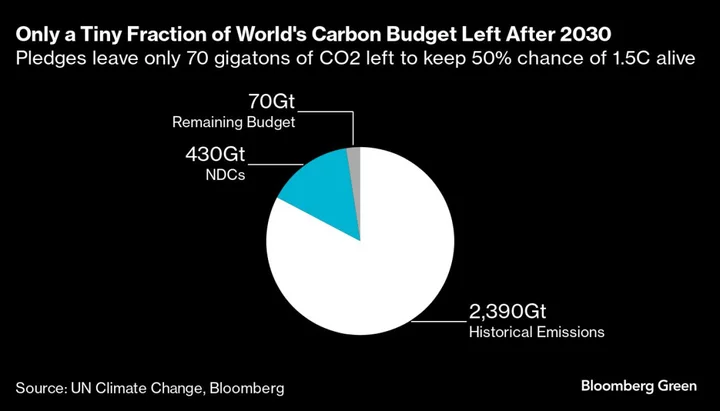The global average temperature will rise as much as 2.8C above pre-industrial levels this century if countries implement their emissions-cutting strategies as planned, according to new analysis from the United Nations.
The UN estimates that carbon emissions released into the atmosphere will increase by about 9% in 2030, compared with 2010 levels, based on current national pledges submitted ahead of the upcoming COP28 climate summit. While that’s a marginal improvement from last year, when emissions were slated to rise nearly 11%, it still means the world will likely overshoot a stretch goal of keeping global warming to below 1.5C, a target laid out by the 2015 Paris Agreement.
Read More: Landmark UN Study Shows Widespread Failure to Meet Climate Goals
The UN report analyzed the so-called nationally determined contributions of the 195 parties of the Paris Agreement, including 20 new or updated pledges submitted up until Sept. 25. A global stocktake at COP28 will inform the next round of climate plans, which are due before 2025.
“COP28 must be a historic turning point in this critical decade,” said Sultan Al Jaber, president of the UN climate summit due to take place in Dubai at the end of the month. “There is simply no time left for delays.”
Read More: To Meet Climate Goals, Gulf Countries Must Overhaul Everything
The best estimate of peak temperature this century is between 2.1C to 2.8C, according to the report. Based on existing climate plans, the world will likely use up 87% of the remaining carbon budget required to keep alive a 50% chance of limiting global warming to 1.5C, leaving only 70 gigatons of CO2 after 2030 — the equivalent of around two years of emissions.
At COP28 countries are set to evaluate the progress, or lack thereof, they have made to meet the objectives of the Paris Agreement. The process will involve laying out what more needs to be done to curb emissions faster, while also putting in place the finance to do so. Still, there are doubts over whether countries can put aside differences that have been exacerbated by growing geopolitical tensions and rising inflation in order to achieve a strong outcome from COP28.
Read More: What Is COP28 and Why Is It Important?
While developed countries and regions, like the EU, have been calling for a phase out of unabated fossil fuels, others, like Saudi Arabia and China are seen as more reluctant to do so. Meanwhile, rich nations are still falling short of providing enough climate finance to their poorer peers to help them deal with the impacts of climate change they have done little to perpetuate.
Simon Stiell, executive secretary of United Nations Framework Convention on Climate Change, said the latest UN assessment shows how quickly the world is running out of time to prevent drastic temperature rises. “We need to rebuild trust in the Paris process,” he said. “This framework is delivering progress, but not fast enough.”

